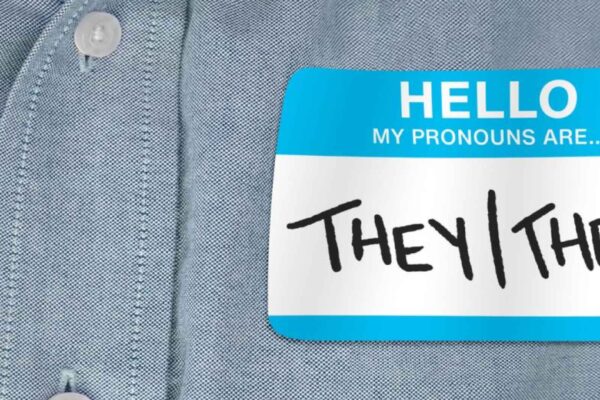Lets talk about how the ACLU of Wyoming has made small, yet significant shifts in its day-to-day practices and we welcome you to do the same.
A few years ago, we made it a practice to add in pronouns to all of our printed materials, and blogpost author biographies. Adding in a pronoun line on printed materials like business cards and blog credentials helps create a more inclusive space that will facilitate people being referred to respectfully and lends the opportunity to talk to people about pronouns and the importance of not making assumptions about people’s identities.
At the ACLU of Wyoming, we focus much of our work advocating for transgender rights and LGBTQ+ and Two Spirit equality. Part of this advocacy requires an intentional shift the norms and culture we create and perpetuate. It is essential that we, as an organization, continue to push ourselves to grow and live out the values that we advocate for externally. By adding pronouns to our business cards, and blog posts, we are taking a small step forward, and hope you consider doing the same.
We know that this may be a new practice many people, so in order to help with this shift we have included frequently asked questions about why pronouns matter.
Why is including pronouns in our work important?
- The practice of asking individuals what pronouns they use for themselves allows organizations to do many things:
- Ensure that the language shared is affirming of everyone present
- Prevents making assumptions about a person’s gender identity
- Increases respect of the diversity of gender identities
- And promotes awareness of transgender, two spirit, and gender nonconforming communities
But aren’t people’s pronouns obvious?
Not at all. A person’s gender identity or the pronouns they use aren’t apparent simply based on their physical body, the sound of their voice, or their mannerisms or behaviors. People may even change their pronouns over time, so it is important to continue to create spaces and opportunities for people to state their pronouns regardless of whether you have done so previously.
What if I do not care about my pronouns?
It is important to remember that everyone is impacted by gender and everyone has a desire to be referred to respectfully. That might mean different things for different people. Regardless of how you may feel about pronouns, it is important to use the pronouns someone uses for themselves.
What if I am having trouble remember someone’s pronoun or if I use the wrong pronoun?
There are several ways to practice someone’s pronouns, including spending time practicing the person’s correct pronoun alone by either writing out a story or brief description of that person or printing out a picture of the person and repeating their pronouns. The important thing to remember is that you should practice proactively and on your own time.
Your response to an individual if you use the wrong pronoun for them will depend on the situation and the individual person since everyone is different, but here are some resources to help make that decision.
How is this related to present and past LGBTQ+ and women’s rights movements?
The ACLU has long advocated for the rights of both transgender and gender nonconforming people to be who they are and to have an equal opportunity to participate fully in all aspects of our society. Because this work is largely focused on eliminating gender stereotypes, it is also deeply connected to our work advocating for women’s rights and the rights of lesbian, gay, and bisexual people.
Language has always been a part of both the LGBTQ+ and women’s rights movements. Some examples of the significance of language within these movements include the fight to use Ms. instead of Mrs. or Miss and the challenge to change the default use of the pronoun “he” to “she.” Language plays a central role in social movements and can track cultural shifts. The ongoing fight to use pronouns that correspond to a person’s gender identity and the inclusion of gender-neutral pronouns is a continuation of these struggles and builds on their legacies.
Will I be required to write down my pronouns?
No. We are suggesting folks incorporate their names and pronouns into daily practice in order to ensure that people know how to address each other respectfully. Some people might not have pronouns that they wish to use and simply want to use their names instead while others feel strongly connected to their pronouns. With pronouns, it is important to be proactive about asking because people will default to whatever pronouns they assume a person uses. Unlike sexuality, which may or may not come up in a conversation, names and pronouns come up in almost every interaction. It is also important to recognize that pronouns and gender identity are not the same thing. They can relate to one another, but they are not one and the same.
A person’s pronouns do not necessarily tell you anything about a person’s gender identity.
What are “gender-neutral” pronouns?
Many gender-neutral pronouns exist. The most commonly used one is “they, them, theirs.” Although the use of “they, them, theirs” to describe a singular person may be unusual for some, the fabulous thing about language is that it changes and evolves.
The word “they” can be used to refer to a single person whose gender identity is nonbinary along with three other separate definitions.
Why is the ACLU of Wyoming doing this?
The ACLU of Wyoming wants to be an example of what it means to respect and celebrate gender diversity. By listing pronouns, we are helping create an environment that embraces authenticity.

